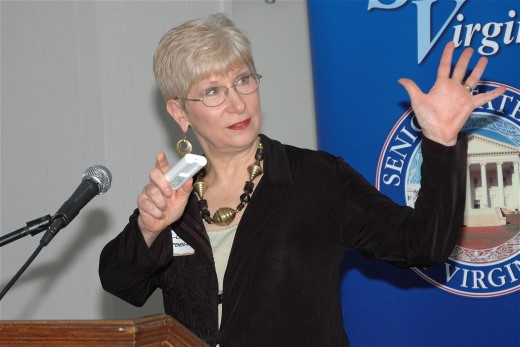Delegates Rob Bell, and David Toscano provided their perspectives on the issues that came before the 2015 legislature. The delegates spoke at the SSV Wednesday, April 8, 2015 meeting. Following two 15-minute presentations, questions were taken from the audience. The program was moderated by SSV member Terry Cooper. Listen to the informative podcast below.
[display_podcast]

 Robert Bell (R) – 58th District: An honors graduate of the University of Virginia and the University of Virginia Law School, Rob served as a state prosecutor for five years. He prosecuted over 2,400 cases, working with the police and crime victims to bring criminals to justice.
Robert Bell (R) – 58th District: An honors graduate of the University of Virginia and the University of Virginia Law School, Rob served as a state prosecutor for five years. He prosecuted over 2,400 cases, working with the police and crime victims to bring criminals to justice.
In the Virginia General Assembly, Rob has written laws that crack down on drunk driving. As a result, MADD (Virginia) named him the 2005 Outstanding Legislator. He is also interested in school safety. In recent years, he has written laws to ban criminal sex offenders from school property during school hours and to require additional background checks on school personnel. In 2008, Rob helped overhaul Virginia’s mental health commitment laws in light of the tragedy at Virginia Tech. And, in 2009, Rob received the Act, Honor, Hope award from the Virginia Sexual and Domestic Violence Action Alliance to recognize his work in the Virginia General Assembly.
An Eagle Scout, Rob was an active volunteer with the Boy Scouts and with the public schools prior to his election in 2001. Rob’s wife, Jessica, is a schoolteacher. She is currently staying home to raise their children, Robbie and Evie. The Bells live in Albemarle County and are members of Aldersgate United Methodist Church.
Rob understands that in tough economic times everyone – business, communities, government – needs to pitch in to create and protect Virginia jobs. That’s why Rob has fought to preserve and promote Virginia’s #1 business-friendly ranking. This helps Virginia’s small businesses to expand and encourages new companies to move here.
In response to the 2007 Virginia Tech shootings, Rob was chosen to lead a special Virginia House of Delegates subcommittee charged with reforming Virginia’s mental health commitment laws. The subcommittee’s goals were to ensure that a similar tragedy would not happen again and to protect the ability of Virginians to voluntarily seek care for themselves. In 2008, as a result of the subcommittee’s work, Virginia saw the most sweeping reforms of mental health commitment laws in 30 years.
Rob and Jessica’s son Robbie attends public school. Jessica is a high school English teacher who is currently taking time off to raise Robbie and Evie. As delegate, Rob regularly visits our schools to talk with students. He has taught more than 1,000 students about civics and how laws are made. Rob has also sponsored local students as pages in the Virginia General Assembly and others have served as interns in his legislative office.
Rob is a champion for our communities against crime. He has led an all-out assault against drunk driving and has fought to protect our families from sex offenders. Rob has served on the Virginia Crime Commission since 2003 and is currently chairman.
 David Toscano (D) – 57th District: David Toscano is serving his third term in the Virginia General Assembly, representing the 57th District of the House of Delegates, where he serves on the Courts of Justice; Transportation; and Science & Technology committees. David also serves on the Disability Commission and has served on the special Joint Subcommittee to Study Land Use Tools in the Commonwealth and the Joint Committee to study Math, Science, and Engineering. He is also a member of the United Way Board and the Chamber of Commerce.
David Toscano (D) – 57th District: David Toscano is serving his third term in the Virginia General Assembly, representing the 57th District of the House of Delegates, where he serves on the Courts of Justice; Transportation; and Science & Technology committees. David also serves on the Disability Commission and has served on the special Joint Subcommittee to Study Land Use Tools in the Commonwealth and the Joint Committee to study Math, Science, and Engineering. He is also a member of the United Way Board and the Chamber of Commerce.
David, his wife Nancy A. Tramontin, and son Matthew live in Charlottesville. David is a practicing attorney and an active volunteer for many community-based organizations.
David is an attorney with Buck, Toscano & Tereskerz, Ltd., and specializes in family law, real estate transactions, and estate planning.
David’s priorities are education, energy, and the environment. He fights for education funding, against teacher pay freezes, and to protect VRS and retirement benefits. He pushes the cause of renewable energy, and stood against those who deny the reality of climate change. He opposes predatory lending in its various forms. He argues for multifaceted transportation programs that include roads, rail, and public transit. He opposes cuts to services for the poor and disabled, defends a woman’s right to choose, and advances reforms in foster care and adoption, so that all children will have the opportunity to live productive lives in family settings free from abuse and neglect.
The Virginia League of Conservation Voters has named David a “Legislative Hero” four times for his work on environmental issues.
David was born in Syracuse, New York, the oldest of five children. He received a bachelor’s degree from Colgate University, a Ph.D. from Boston College, and a law degree from the University of Virginia. He has taught politics and sociology at various colleges and universities, including Boston College, University of Maryland (European Division), PVCC, University of Virginia, and James Madison University. He recently taught for the University of Virginia as part of its 14-week Semester at Sea program.
David served on the Charlottesville City Council from 1990 to 2002 and as Mayor 1994-96. David is a resident of the City of Charlottesville, where he lives with his wife, Nancy A. Tramontin, and their son, Matthew.
Program Summary
The following excerpted from the coverage provided by The Daily Progress written by Derek Quizon and appearing in the April 9 edition. The full story is available on the The Daily Progress website.
Dels. David J. Toscano, D-Charlottesville, and Rob Bell, R-Albemarle, called for the state to strip the Department of Alcoholic Beverage Control of its law enforcement powers at a legislative forum Wednesday afternoon. ABC, Medicaid expansion and sexual assault were among the topics the legislators discussed with residents during the question-and-answer session.
Legislators disagree on Medicaid expansion
Medicaid expansion — the decision over whether to increase state Medicaid rolls in compliance with the federal Affordable Care Act — was on the minds of many of the attendees, although it was never addressed in the latest General Assembly session. The delegates were greeted by pro-expansion demonstrators standing outside the center with signs with slogans like “Honk your horn for Medicaid expansion” and “Affordable care for all.” Toscano and Bell, who are on opposite sides of the issue, each presented different arguments. “I’ve been crusading for Medicaid reform for a long time,” Toscano said. “I think it creates jobs and helps a lot of people who need it.” Bell said the state needs to get the costs of the current program down and make sure an expansion would be sustainable. Virginia currently spends about $3.79 billion from its general fund on Medicaid, up from $1.6 billion in the 2003 fiscal year, according to Susan Massart, a fiscal analyst for the state House Appropriations Committee. Legislative Republicans say they want to rein in the growth before any expansion.
Sexual assault bill touted
The legislators also talked about the bill passed during the session that would create a sexual assault reporting procedure at campuses across the state. The bill — which would go into effect if the legislature approves some minor changes by Gov. Terry McAuliffe — requires university administrators to bring reports of sexual assault to a Title IX coordinator. The coordinator, a representative of law enforcement and a student representative would review reports and bring them before prosecutors. There is no requirement for a victim to press charges or cooperate with prosecutors. If law enforcement and prosecutors decide there is a threat to the safety of a community, they would have the ability to push forward with an investigation. Bell said a goal of the legislation is to balance the privacy of the victim with public safety. “We didn’t want to keep spreading that information [on sexual assault reports] further and further, but we wanted a prosecutor to review it,” he said.
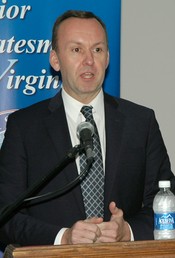 Jesse Rutledge is vice president for external affairs at the National Center for State Courts (NCSC) in Williamsburg, Virginia. On December 9, 2015, he talked about how Virginia and other states select their state-court judges and the advantages and disadvantages of each method. In this podcast, you will learn how many states let the people pick their judges through popular elections and what the US Supreme Court had to say about freedom of speech when judges must also be “candidates” like other politicians. Virginia is one of two states that select judges by vote of the legislature. The program was moderated by SSV board member Terry Cooper.
Jesse Rutledge is vice president for external affairs at the National Center for State Courts (NCSC) in Williamsburg, Virginia. On December 9, 2015, he talked about how Virginia and other states select their state-court judges and the advantages and disadvantages of each method. In this podcast, you will learn how many states let the people pick their judges through popular elections and what the US Supreme Court had to say about freedom of speech when judges must also be “candidates” like other politicians. Virginia is one of two states that select judges by vote of the legislature. The program was moderated by SSV board member Terry Cooper.
 Dahlia Lithwick is a senior editor at
Dahlia Lithwick is a senior editor at 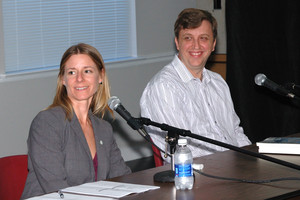
 Elaine Cheng, managing director and chief information officer at
Elaine Cheng, managing director and chief information officer at  Eric Rzeszut is the help desk manager at UVA’s
Eric Rzeszut is the help desk manager at UVA’s 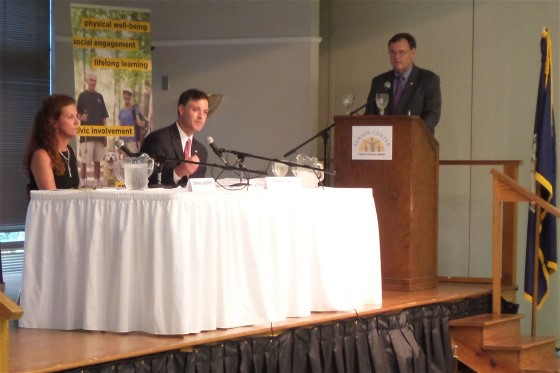
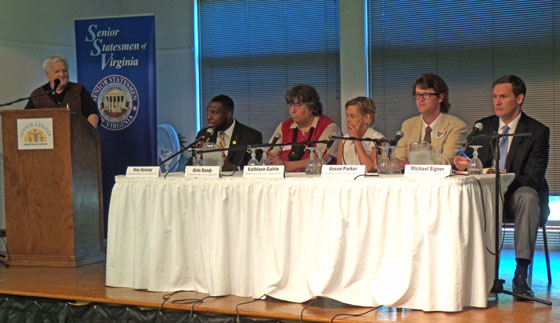
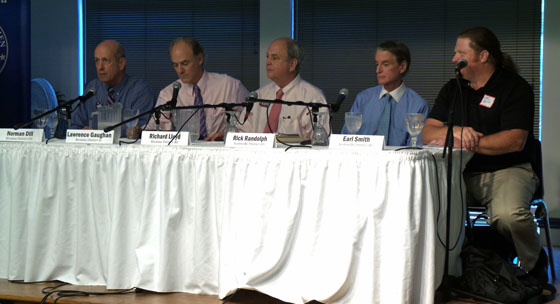
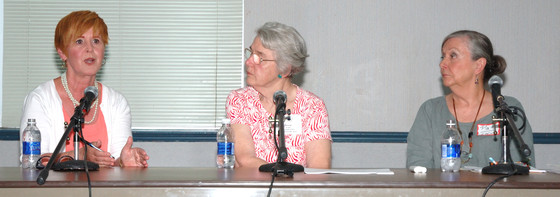


 Robert Bell (R) – 58th District: An honors graduate of the University of Virginia and the University of Virginia Law School, Rob served as a state prosecutor for five years. He prosecuted over 2,400 cases, working with the police and crime victims to bring criminals to justice.
Robert Bell (R) – 58th District: An honors graduate of the University of Virginia and the University of Virginia Law School, Rob served as a state prosecutor for five years. He prosecuted over 2,400 cases, working with the police and crime victims to bring criminals to justice. David Toscano (D) – 57th District: David Toscano is serving his third term in the Virginia General Assembly, representing the 57th District of the House of Delegates, where he serves on the Courts of Justice; Transportation; and Science & Technology committees. David also serves on the Disability Commission and has served on the special Joint Subcommittee to Study Land Use Tools in the Commonwealth and the Joint Committee to study Math, Science, and Engineering. He is also a member of the United Way Board and the Chamber of Commerce.
David Toscano (D) – 57th District: David Toscano is serving his third term in the Virginia General Assembly, representing the 57th District of the House of Delegates, where he serves on the Courts of Justice; Transportation; and Science & Technology committees. David also serves on the Disability Commission and has served on the special Joint Subcommittee to Study Land Use Tools in the Commonwealth and the Joint Committee to study Math, Science, and Engineering. He is also a member of the United Way Board and the Chamber of Commerce.
